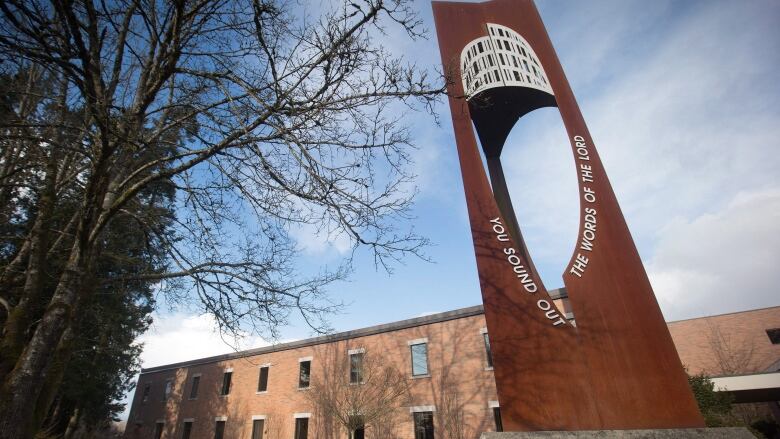3 legal reactions to the Supreme Court's Trinity Western University decision
Lawyers raise concerns for weight given to quasi-judicial bodies across the country

TheSupreme Court of Canada's decision to deny a B.C. Christian university's plan toaccredit a new law school settles a case that has been working its way through the courts for years, but lawyers say it also creates a complicated legacy for how future legal judgmentswill be made.
Some argue the decision that went against Trinity Western University sets a precedentstrongly affirmingLGBTrights and the story ends there.Others, regardless of whether they are in favour of the decision or against it, say it goes beyond that, prompting worry over how rights will be balanced.
In two7-2 rulings, the majority of justices on the high court ruled thatthe law societies of British Columbia and Ontario have the power to refuse accreditation of a law school based on TWU'srequirement that students follow a strict code of conduct including abstinencefrom sex outside of heterosexual marriage.
Below are three legal observations about the ruling and its implications.
1. Karey Brooks, JFK Law, who intervened in the case on behalf of the B.C.LGBTQ Coalition
Brooks said one big positive to come out of the decision is that it rejects the notion that exclusionary religious practices can be protected by the Charter of Rights and Freedoms.
"The majority recognized that excluding students from law school on the basis of their sexual orientation was degrading and disrespectful and resulted in a concrete, not abstract,harm," Brooks said.
She noted that this was an important ruling for future legal decisions. Had TWU been allowed to exclude LGBTQstudents, she said,it would sendthe signal that this groupdeserves less protection under the lawthan other historically oppressed minority groups.
"On sexual orientation as a protected ground, it certainly puts it in the right place to be protected along the other groups who have been recognized as facing stereotypes and discrimination and prejudice," Brooks said.
"It'ssomething the LGBTQcommunity has really been fighting for the last couple of decades to have their rights recognized equally, so this case is really importantgoing forward for that purpose."
2.Cheryl Milne, executive director of the David Asper Centre for Constitutional Rights at the University of Toronto
Milne notes that while many in the legal profession welcomed the ruling, they hadconcerns with how the Supreme Court reached its decision.
"The real nugget has to do with the administrative law standards that were applied in this case, where an administrative decision maker is balancing charter rights," Milne said.
"It gives a lot of deference to the tribunal;it says they are the expert, they get to make this decision in respect of their own jurisdiction and we'll give them deference to their decision so long as it is reasonable."
Milne said that there is not a widespread concern for how religious rights were interpretedor how the rights of the LGBTQ community were protected in the decision, but rather what the implications are for other controversial decisions made by quasi-judicial bodies.
She said, for example, it is not clear if the provincial human rights bodies will be allowed to rule that a religious right can be violated on reasonable grounds. If and when it does make that decision, a court, she said, would likely give that body's decision more leeway than before and that would be felt widely across the country.
"Everything from residential tenanciesare impacted," she said. "People's lives can be significantly impacted by the decisions made by administrators, whether that's tribunals that have hearings, or individuals that are reviewing applications for things, or ruling on complaints."
3.Gerald D. Chipeur, Q.C. of Miller Thomson LLP, intervened on behalf of the Seventh-day Adventist Church in Canada
Chipeurnotes that if tribunals, boards and other bodies make decisions that violate religious rights under the charter they might now be given more freedom to make those decisions.
"The reality is that tribunals, boards, anyone who is making decisions regarding the rights of others, will now be given leeway they can actually violate the religious freedoms of Canadians as long they are within a range of reasonableness," he said.
Describing the ruling as a "significant limitation on the rights of all Canadians to freedom of religion," Chipeursaid he is hoping the ruling will be limited to the specific case of Trinity Western Universityand will not be rolled into judgments made by courts across the country.
Chipeursaid that if there is a significant eroding of religious rights in Canada, other legislative bodies will need to reaffirm those rights.
"In the absence of decision by the Supreme Court to protect religious freedom of Canadians, the legislative assembly of Ontario and British Columbia are going to have to step up and do that."












_(720p).jpg)


 OFFICIAL HD MUSIC VIDEO.jpg)
.jpg)



























































































